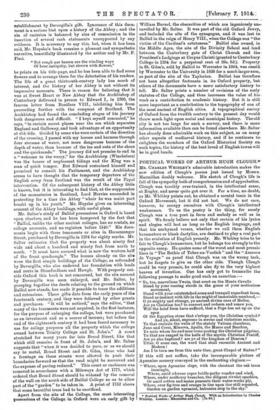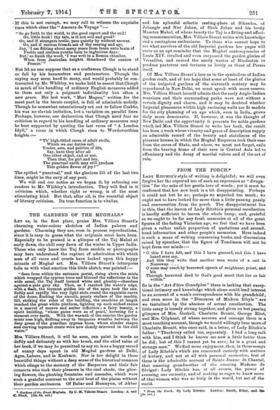POETICAL WORKS OF ARTHUR HUGH OLGUG11..* MR, CHARLES Wwinrav's admirable
introduction makes the new edition of Clough's poems just issued by Messrs. Macmillan doubly welcome. His sketch of Clough's life is full of the sympathy both of comprehension and of approbation. Clough was terribly over-trained, in the intellectual sense, at Rugby, and never quite got over it. For a time, no doubt, as Mr. Whibley points out, he obtained a mental tonic in the Oxford Movement, but it did not last. We do not care, however, to occupy ourselves with Clough's intellectual weaknesses. To us the poetry is the thing, for surely Clough was a true poet in form and melody as well as ire spirit. We firmly believe not only that certain of his lyrics and elegies will last as long es the English language, and that his unrhymed verses, whether we call them English hexameters or blank dactylics, are destined to play a real part in the evolution of English prosody. Mr. Whibley tries to be fair to Clough's hexameters, but he belongs too strongly to the opposite camp. He quotes some of the worst and most prosaic lines in "The Bothie of Tober-na-Vuolich" and the "Amours de Voyage" as proof that Clough was on the wrong tack, but he forgets to give us the other aide. Though Clough- could be very prosaic, he could also fly to the very highest heaven of invention. One has only got to transcribe the following passage to make good such an assertion:- " Ye, too, marvellous Twain, that erect on the Monte Cavallo Stand by your rearing steeds in the grace of your motionless• movement, Stand with year outstretched arms and tranquil regardant faces, Stand as instinct with life in the might of immutable manhood,- 0 ye mighty and strange, ye ancient divine ones of Hellas,
Are ye Christian too P to convert and redeem and renew you, Will the brief form have sufficed, that a Pope has set up on the apex
Of the Egyptian stone that o'ertops you, the Christian symbol?' And ye, silent, supreme in serene and victorious marble, Ye that encircle the walls of the stately Vatican chambers, Jane and Ceres, Minerva, Apollo, the Muses and Bacchus, Ye unto whom far and near come posting the Christian pilgrims, Ye that are ranged in the halls of the mystic Christian Pontiff, Are yo also baptised P are ye of the kingdom of. Heaven ?
Utter, 0 some one, the word that shall reconcile Ancient and. Modern !
Am I to tarn me from this unto thee, great Chapel of Sixtus ?" If this will not suffice, take the incomparable picture of Apennine scenery conveyed in the enchanting -elegiacs :— "Where, upon Apennine slope, with the chestnut the oak trees
immingle,
Where, amid odorous copse bridle-paths wander and wind, Where, under mulberry branches, the diligent rivulet sparkles, Or amid cotton and maize peasants their water-works-ply, Where, over fig-tree and orange in tier upon tier still repeated, Garden on garden upreared, balconies step, to the sky."
• Perifre; Wet. el Alahr Hugh. Clough. with on Introduatiou by Chadic Whiblay. Landon:_ Efeamillea end CO. gt gda
- If this is not enough, we may call to witness the exquisite
• lines which close the-" Amours de Voyage ":- So go forth to the world, to the good report and the evil! Go, little book I thy tale, is it not evil and good? do, and if strangers revile; pass quietly by without answer. Go, and if curious friends ask of thy rearing and age, .Say, 'fain flitting about many years from bram unto brain of Feeble and restless youths born to inglorious days: But,' so finish the word, •I was writ in a Roman chamber, When from Janiculan heights thundered the cannon of
France.'
But let no one suppose that as a craftsman Clough is to stand or fall by his hexameters and pentameters. Though the saying may seem hard to many, and would probably be con- troverted by Mr. Whibley, we make bold to assert that Clough in much of his handling of ordinary English measures added to them not only a poignant individuality but often a new grace. His last work, "Mari Magno," written for the most part in the heroic couplet, is full of admirable melody. Though he somewhat ostentatiously net out to follow Orabbe, iris was no slavish imitation, but a variation on parallel lines. Perhaps, however, our declaration that Clough need fear no criticism in regard to his handling of ordinary measures may be hest supported by quoting the last verse of "A London Idyll," a verse in which Clough rises to Wordaworthian &eights
"TW high-titled cares of adult strife, Which we our duties call, Trades, arts, and politics of life, Say, have they after all One other object, end or use, Than that, for girl and boy, The punctual earth may still produce
This golden flower of joy ?"
'The epithet " punctual," and the glorious lilt of the last two dines, might be the envy of any poet.
We will end our notice as we began it, by referring our readers to Mr. Whibley's introduction. They will find in it -criticism which, whether right or wrong, is of the most stimulating kind. But that, after all, is the essential object of literary criticism. Its true function is to vitalize.











































 Previous page
Previous page